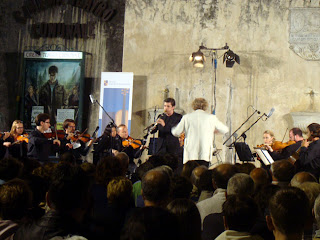On the main road at the end of our track is a parking space containing the local recycling bins. Things don’t stay there long - recovering and redistributing is the local sport.
So far we’ve acquired a table for the terrace
two sun loungers
a garden bench in need of resuscitation
and (best find) a deep porcelain sink that’s going to become a herb garden.
Yesterday I was beaten to an ice box (ex Ikea, pristine) by an elderly Italian lady twice my width but much less inhibited about climbing into the skip and having a serious rummage. A television set with a broken, but fixable, on/off switch made up for it later. So now we can watch Berlusconi TV with half naked girls on seven inch heels fawning over paunchy, middle-aged presenters!
I can't believe how lucky I am to be here. It's the kind of luck where you feel it's too perfect to continue - something is bound to go wrong. How British is that?
So far we’ve acquired a table for the terrace
two sun loungers
a garden bench in need of resuscitation
and (best find) a deep porcelain sink that’s going to become a herb garden.
Yesterday I was beaten to an ice box (ex Ikea, pristine) by an elderly Italian lady twice my width but much less inhibited about climbing into the skip and having a serious rummage. A television set with a broken, but fixable, on/off switch made up for it later. So now we can watch Berlusconi TV with half naked girls on seven inch heels fawning over paunchy, middle-aged presenters!
I can't believe how lucky I am to be here. It's the kind of luck where you feel it's too perfect to continue - something is bound to go wrong. How British is that?

































